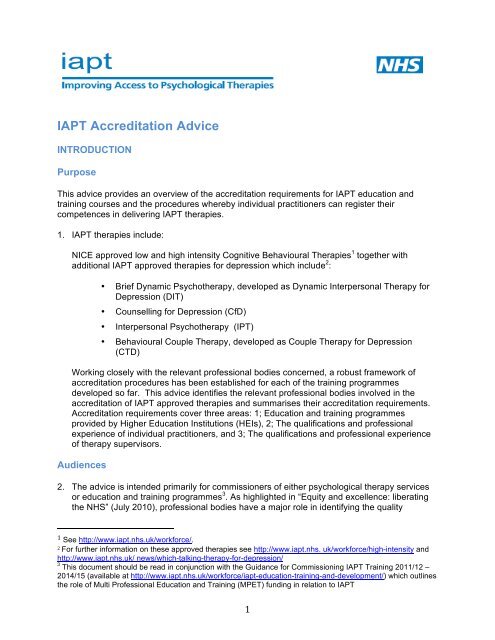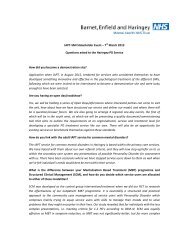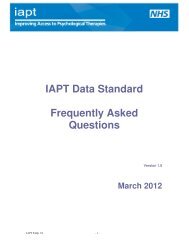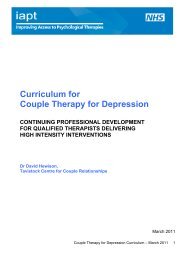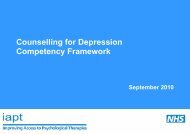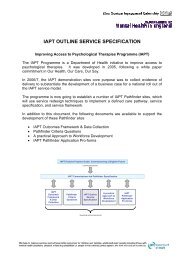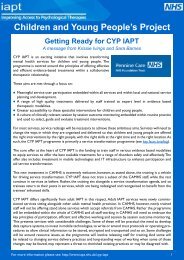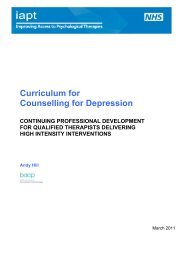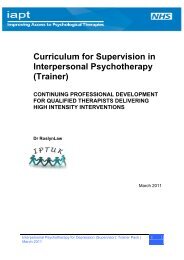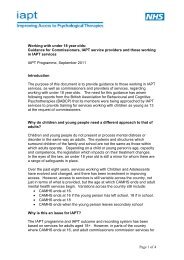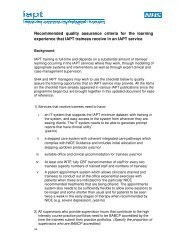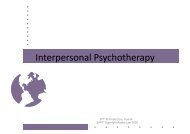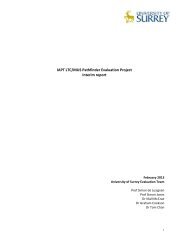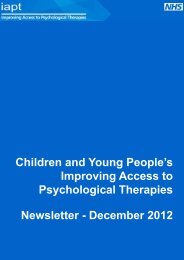IAPT Accreditation Advice (Jan 2012) - IT Shared Services
IAPT Accreditation Advice (Jan 2012) - IT Shared Services
IAPT Accreditation Advice (Jan 2012) - IT Shared Services
You also want an ePaper? Increase the reach of your titles
YUMPU automatically turns print PDFs into web optimized ePapers that Google loves.
<strong>IAPT</strong> <strong>Accreditation</strong> <strong>Advice</strong><br />
INTRODUCTION<br />
Purpose<br />
This advice provides an overview of the accreditation requirements for <strong>IAPT</strong> education and<br />
training courses and the procedures whereby individual practitioners can register their<br />
competences in delivering <strong>IAPT</strong> therapies.<br />
1. <strong>IAPT</strong> therapies include:<br />
NICE approved low and high intensity Cognitive Behavioural Therapies 1 together with<br />
additional <strong>IAPT</strong> approved therapies for depression which include 2 :<br />
• Brief Dynamic Psychotherapy, developed as Dynamic Interpersonal Therapy for<br />
Depression (D<strong>IT</strong>)<br />
• Counselling for Depression (CfD)<br />
• Interpersonal Psychotherapy (IPT)<br />
• Behavioural Couple Therapy, developed as Couple Therapy for Depression<br />
(CTD)<br />
Working closely with the relevant professional bodies concerned, a robust framework of<br />
accreditation procedures has been established for each of the training programmes<br />
developed so far. This advice identifies the relevant professional bodies involved in the<br />
accreditation of <strong>IAPT</strong> approved therapies and summarises their accreditation requirements.<br />
<strong>Accreditation</strong> requirements cover three areas: 1; Education and training programmes<br />
provided by Higher Education Institutions (HEIs), 2; The qualifications and professional<br />
experience of individual practitioners, and 3; The qualifications and professional experience<br />
of therapy supervisors.<br />
Audiences<br />
2. The advice is intended primarily for commissioners of either psychological therapy services<br />
or education and training programmes 3 . As highlighted in “Equity and excellence: liberating<br />
the NHS” (July 2010), professional bodies have a major role in identifying the quality<br />
1 See http://www.iapt.nhs.uk/workforce/. <br />
2 For further information on these approved therapies see http://www.iapt.nhs. uk/workforce/high-intensity and<br />
http://www.iapt.nhs.uk/ news/which-talking-therapy-for-depression/ <br />
3 This document should be read in conjunction with the Guidance for Commissioning <strong>IAPT</strong> Training 2011/12 –<br />
2014/15 (available at http://www.iapt.nhs.uk/workforce/iapt-education-training-and-development/) which outlines<br />
the role of Multi Professional Education and Training (MPET) funding in relation to <strong>IAPT</strong><br />
<br />
1
standards that should guide the commissioning of services and the training, qualifications<br />
and experience of the workforce employed within these services.<br />
3. This advice should also be of use to HEIs, individual practitioners and therapists. Similarly,<br />
mental health charities and individual patients or clients might also find the information<br />
helpful in identifying therapists who have been trained on an <strong>IAPT</strong> commissioned course and<br />
whether they have joined a voluntary register indicating the nature of their training and<br />
possibly, in some cases, fitness to practice.<br />
<strong>Accreditation</strong> and professional bodies<br />
4. Both psychotherapy and psychological therapies are not yet subject to statutory regulation,<br />
despite there having been widely publicised discussions between professional bodies and<br />
the previous government. Nevertheless, many therapists are subject to regulation since they<br />
are members of healthcare professions regulated by the General Medical Council (GMC),<br />
the Nursing and Midwifery Council (NMC) or the Healthcare Professions Council (HPC).<br />
Hence medical practitioners, nurses, psychologists, social workers and other registered<br />
practitioners who practice psychotherapy are subject to statutory regulation, whereas many<br />
other psychotherapists and counsellors who are not members of these professions are not.<br />
However, there are many professional bodies associated with these practitioners who offer<br />
voluntary registers which many therapists join and hence are subject to registration and<br />
accreditation.<br />
5. Prior to the <strong>IAPT</strong> programme, relevant professional bodies 4 had extensive accreditation<br />
procedures for existing psychological therapies training programmes. Modifications to these<br />
procedures have been implemented to encompass the specific requirements of the <strong>IAPT</strong><br />
national curricula and their training programmes.<br />
Course <strong>Accreditation</strong><br />
6. The main focus has been on course accreditation whereby each <strong>IAPT</strong> training programme<br />
hosted within an HEI has had its curriculum and teaching materials scrutinised, its staffing<br />
and resources judged as appropriate, and its management and governance structures<br />
reviewed, including interfaces with trainees, supervisors, local NHS services and service<br />
users. The scrutiny process, in particular, determines that the course is delivered<br />
consistently with the national curricula as agreed and laid down for <strong>IAPT</strong>.<br />
7. <strong>IAPT</strong> training is a joint initiative between HEIs and clinical services, with key aspects of the<br />
training (such as observing skilled therapists in practice and regular supervision) being<br />
delivered by the <strong>IAPT</strong> services that partner the HEIs. For this reason, the services in which<br />
<strong>IAPT</strong> trainees are trained and supervised are also required to meet certain <strong>IAPT</strong> quality<br />
standards (See ‘<strong>IAPT</strong> Implementation Plan: National guidelines for regional delivery’; in<br />
particular Chapter 4, ‘Characteristics of an <strong>IAPT</strong> Service’ and Annex A: ‘Criteria for training<br />
provider selection’; http://www.iapt.nhs.uk/silo/files/implementation-plan-national-guidelinesfor-regional-delivery.pdf).<br />
4 BACP; British Association of Counselling and Psychotherapy: BABCP; British Association of Cognitive<br />
and Behavioural Psychotherapy: BPC; British Psychoanalytic Council: BPS; British Psychological Society:<br />
BSCPS; British Society of Couple Psychotherapists and Counsellors: IPTUK; Interpersonal Therapy UK:<br />
UKCP; United Kingdom Council for Psychotherapy: HPC; Health Professions Council<br />
<br />
2
8. Decisions to accredit a programme are arrived at after a detailed examination of the course’s<br />
documentation and procedures, including those that rely on partnership with services. The<br />
examination usually includes a visit to the programme by a team of experts (i.e. therapists<br />
and trainers), with meetings between trainees, senior HEI managers, Regional <strong>IAPT</strong> Leads,<br />
and representatives from supervisors, local NHS services and the SHA.<br />
9. Programmes have to meet conditions before they are fully accredited. Once these are met,<br />
the period of accreditation can be for a number of years, and renewed annually assuming<br />
the programme has not experienced major changes or been subject to complaints. The<br />
period for which a course is accredited varies for each professional body. The professional<br />
bodies have a list of all <strong>IAPT</strong> courses currently accredited on their respective websites.<br />
Details of complaints processes, against courses or individuals, can also be found on the<br />
professional body’s website.<br />
Individual <strong>Accreditation</strong><br />
10. In addition to course accreditation, some professional bodies also offer individual<br />
accreditation for <strong>IAPT</strong> practitioners. There are many reasons why individual accreditation is<br />
offered including:<br />
• Newly qualified therapists having to gain additional experience before being fully<br />
recognised as competent to practice in <strong>IAPT</strong> services (e.g. BABCP),<br />
• Some practitioners having been employed as Psychological Well-being Practitioners<br />
(PWPs) in <strong>IAPT</strong> services on the basis of prior experience and training as graduate<br />
mental health workers, and who wish to register their new PWP role,<br />
• Where practitioners have benefited from top-up or continuing professional<br />
development (CPD) <strong>IAPT</strong> training, or have previously trained on a relevant and<br />
professionally accredited training course for an <strong>IAPT</strong> recognised psychological<br />
therapy, but prior to the implementation of <strong>IAPT</strong> as a mode of delivery of<br />
psychological therapy.<br />
11. In such cases, individual therapists have to prove that they have successfully completed a<br />
relevant training course, supply a portfolio or log of clinical work and additional training, and<br />
usually have supervisors’ reports or references. Once a practitioner gains individual<br />
accreditation status, their individual name is usually recorded on a voluntary register,<br />
available for inspection on the website of the respective professional body.<br />
12. Most professional bodies require practitioners to renew their registration annually or be reaccredited<br />
on a regular basis. It is usual to require evidence of ongoing supervision and CPD<br />
during the renewal period. <strong>Services</strong> employing <strong>IAPT</strong> practitioners should ensure that they<br />
are able to meet these renewal or re-accreditation requirements. One approach is to ensure<br />
that they provide access to regular supervision and CPD, to ensure that practitioners meet<br />
the requirements for either annual renewal or re-accreditation. <strong>Services</strong> can also require<br />
that practitioners are individually accredited with appropriate organisations before they are<br />
appointed by ensuring that such requirements are included in person specifications and job<br />
descriptions.<br />
13. Some professional bodies will also deal with complaints against registrants and deal with<br />
fitness to practice cases. However, the responsibility for registration and fitness to practice<br />
for nurses, psychiatrists, psychologists, and some other professions usually falls to the<br />
<br />
3
elevant healthcare regulatory body (e.g. HPC, GMC, NMC). Since not all practitioners will<br />
be voluntarily registered with a relevant professional body, employers should ensure that all<br />
<strong>IAPT</strong> practitioners/therapists agree to abide by an appropriate Code of Ethical Conduct and<br />
Behaviour, as part of their contract of employment 5 .<br />
14. Given that many psychological therapists, including those working in <strong>IAPT</strong> services are not<br />
statutorily regulated but subject only to voluntary registration, services need to consider how<br />
they can encourage their practitioners to become accredited and remain registered with the<br />
relevant professional bodies that have developed <strong>IAPT</strong> relevant accreditations. Employers<br />
also have a responsibility to ensure that staff operate within their clinical governance<br />
standards.<br />
15. In summary, both course and practitioner accreditation provides the assurances to<br />
commissioners and the public that training programmes have met the required quality<br />
standards, and that the services commissioned have employed a suitably trained workforce.<br />
There are numerous psychotherapy organisations offering training in psychotherapy, and it is<br />
essential that <strong>IAPT</strong> services employ those practitioners whose training or equivalent<br />
experience has been recognised by the relevant professional body.<br />
ACCRED<strong>IT</strong>ATION OF <strong>IAPT</strong> PROGRAMMES 6<br />
Low intensity CBT and PWP courses<br />
16. Psychological Well-being Practitioner (PWP) courses are accredited by the British<br />
Psychological Society. The accreditation process involves representatives of PWP courses,<br />
which have received full accreditation for five years. Further information is provided on the<br />
BPS website 7 . There are two schemes of individual practitioner accreditation offered by both<br />
BABCP and the BPS. The BPS offers a voluntary register of psychology graduates who have<br />
successfully completed an accredited PWP programme. A more extensive scheme of<br />
individual practitioner accreditation is offered by BABCP, which is not restricted to just<br />
psychology graduates, as is the case for the BPS, but is open to all PWPs and also to<br />
people who may have been employed as a PWP initially in <strong>IAPT</strong> services and before the<br />
training was available 8 . These latter individuals have usually done a top-up PWP training<br />
consisting of the first two modules of the national PWP curriculum. Requirements for<br />
supervisors are detailed by both BPS and BABCP.<br />
High Intensity CBT courses<br />
5 See the example supervision agreement provided by the BABCP at Annex 1 of:<br />
http://www.iapt.nhs.uk/silo/files/ethical-codes-for-non-professionally-affiliated-staff-.doc <br />
6 We have signposted readers for further information to the relevant websites of the professional bodies<br />
involved. However, these sites may be updated, and the address modified from time to time by the<br />
professional bodies involved. If you are unable to access any of the addresses within this guidance,<br />
please contact the professional body directly for guidance.<br />
7 http://www.bps.org.uk/careers-education-training/accredited-courses-trainingprogrammes/psychological-wellbeing-practition<br />
<br />
8 http://www.babcp.com/<strong>Accreditation</strong>/PWP/PWP_<strong>Accreditation</strong>.aspx <br />
<br />
4
17. High intensity CBT courses are accredited by BABCP 9 . Visiting accreditation teams will have<br />
<strong>IAPT</strong> advisors and course staff/trainees from other <strong>IAPT</strong> training programmes, as well as<br />
BABCP accreditation officers.<br />
18. Newly qualified graduates from High Intensity <strong>IAPT</strong> CBT courses are only provisionally<br />
accredited in their first 12 months following qualification. Again, there are two schemes of<br />
individual practitioner accreditation. An extensive scheme is offered by BABCP and is<br />
summarised on its website 10 .<br />
19. Further information about supervision in <strong>IAPT</strong> services and competency requirements for<br />
supervisors is available at http://www.iapt.nhs.uk/workforce/supervisors/.<br />
20. The BPS also operates a register of HPC registered Chartered Psychologists who have<br />
successfully completed an accredited High Intensity <strong>IAPT</strong> CBT course (available to view at<br />
http://www.bps.org.uk/psychology-public/find-psychologist/get-directory/iapt-registerapplications/improving-access-psycho).<br />
Brief Dynamic Interpersonal Therapy for Depression (D<strong>IT</strong>) 11<br />
21. The British Psychoanalytic Council (BPC) is now acting as a fully functioning accrediting<br />
organisation and has recently approved the ‘Anna Freud Centre and The Tavistock and<br />
Portman NHS Foundation Trust’ as an accredited training provider for D<strong>IT</strong>. <strong>Accreditation</strong> will<br />
examine the 4-day D<strong>IT</strong> course, one additional day for <strong>IAPT</strong>, and the end of course role-play.<br />
Trainees have to pass all elements, including the role-play to go forward to become<br />
practitioners, and then subsequently and successfully complete two supervised case studies.<br />
22. For new providers to become an accredited D<strong>IT</strong> training provider, training establishments<br />
need a course leader who has shadowed an accredited D<strong>IT</strong> course, and a D<strong>IT</strong> accredited<br />
practitioner to co-lead the first course. Further information is available from the BPC<br />
website 12 .<br />
Counselling for Depression (CfD)<br />
23. <strong>Accreditation</strong> for CfD is through the British Association for Counselling and Psychotherapy<br />
(BACP). Successful completion of an appropriately commissioned CfD course, including the<br />
practice hours, can be counted towards the training and practice criteria of an application for<br />
accreditation as a BACP accredited counsellor/ psychotherapist or for an application as a<br />
BACP accredited Supervisor of counsellors/ psychotherapists.<br />
9 See http://www.babcp.com/<strong>Accreditation</strong>/Course/<strong>IAPT</strong>_Course_<strong>Accreditation</strong>.aspx<br />
10 See http://www.babcp.com/<strong>Accreditation</strong>/Practitioner/Practitioner_<strong>Accreditation</strong>.aspx and also<br />
http://www.iapt.nhs.uk/silo/files/iaptbabcp-pwp-statement-august-2011-final.pdf <br />
11 The training programmes for all four <strong>IAPT</strong> modalities in addition to CBT, have been designed to deliver<br />
their associated competence frameworks and national curricula. In addition, the relevant professional<br />
bodies have been developing or adapting their existing accreditation processes. With the commissioning<br />
of further training places across the modalities as described in Talking Therapies: A four Year Plan of<br />
Action, further work will be required to monitor how courses are meeting the combined requirements for<br />
accreditation and quality assurance for <strong>IAPT</strong> service delivery and the relevant professional body. <br />
12 http://www.psychoanalytic-council.org/main/index.phppage=15952 <br />
<br />
5
24. For counsellors who are already accredited members of BACP, successful completion of a<br />
commissioned CfD course would be accepted as evidence of meeting CPD requirements for<br />
their annual renewal of accreditation. A new category of sector specific Senior <strong>Accreditation</strong><br />
in <strong>IAPT</strong> High-Intensity Counselling has been developed and is being launched by BACP in<br />
2011.<br />
25. BACP has developed a quality assurance procedure for CPD training programmes. The<br />
associated award is designed to reassure trainees about the quality standards and relevance<br />
of the CPD activity on offer. This award would be applicable to the CfD training programme.<br />
26. Successful accreditation is conditional upon training providers being able to demonstrate that<br />
they have reached the required standard. An application in the form of a portfolio of evidence<br />
is submitted for scrutiny to the BACP Professional Standards Department. Assessment<br />
includes the recruitment and selection of trainers, trainee selection criteria, supervision<br />
arrangements and adherence to course content. BACP CPD endorsement entitles course<br />
providers to use the BACP logo when issuing a certificate to trainees who successfully<br />
complete both training and practice elements of CfD training<br />
(http://www.bacp.co.uk/accreditation/).<br />
Interpersonal Psychotherapy for Depression (IPT)<br />
26. Interpersonal Psychotherapy UK (IPTUK) is the accrediting body. A formal course<br />
accreditation is under discussion. Contact should be made with IPTUK for details<br />
(http://www.interpersonalpsychotherapy.org.uk/).<br />
27. Clinical groups who have evolved as trainers share materials. Existing courses have begun<br />
to link with HEIs (in London, Edinburgh and Surrey) and a formal transparent process is<br />
being developed by IPTUK. This will be paper-based to provide evidence for accreditation.<br />
Currently there is only one course provider for IPTUK/<strong>IAPT</strong>.<br />
28. <strong>Accreditation</strong> of new IPT/<strong>IAPT</strong> training providers will require trainers to have completed an<br />
IPTUK recognised course and completed supervisor level accreditation with an IPTUK<br />
accredited supervisor. Existing IPTUK trainers must demonstrate capacity to deliver training<br />
in compliance with the <strong>IAPT</strong> training and supervision protocol. Novice IPT trainers must<br />
shadow one round of IPT <strong>IAPT</strong> training prior to delivering the training independently.<br />
29. All new IPT/<strong>IAPT</strong> training providers will be asked to submit a course outline and programme<br />
of supervision to IPTUK, to be assessed against the <strong>IAPT</strong> national curriculum and training<br />
protocol. Details of accredited courses and supervisors are available at<br />
http://www.interpersonalpsychotherapy.org.uk/.<br />
Couple Therapy for Depression (CTD)<br />
30. The British Society of Couple Psychotherapists and Counsellors (BSCPC) is the lead<br />
accrediting body for Couple Therapy for Depression practitioners, supervisors and training<br />
<br />
6
courses. They offer a comprehensive approach to the accreditation of courses, practitioners<br />
and supervisors 13 ).<br />
31. <strong>Accreditation</strong> as a Practitioner<br />
This is determined by successful completion of the two elements of the Practitioner Training;<br />
an accredited training course that delivers the <strong>IAPT</strong> curriculum, and successful completion of<br />
2 Couple Therapy for Depression cases. Successful completion of each of these elements<br />
results in certification and the right to be listed as an Accredited Couple Therapy for<br />
Depression <strong>IAPT</strong> Practitioner on the BSCPC website. There is no obligation to apply for<br />
Membership of the BSCPC, but practitioners will be expected to be registered with their<br />
usual registering bodies (BABCP, BACP, BPS, HPC, etc), and adhere to their professional<br />
development standards.<br />
32. <strong>Accreditation</strong> as a Supervisor<br />
This is determined by successful completion of the three elements of the Supervision<br />
Training; the supervisors training course, successful completion of a further two Couple<br />
Therapy for Depression cases, and a consultation exercise. Supervisors can then apply to<br />
have their names listed as an Accredited Couple Therapy for Depression <strong>IAPT</strong> Supervisor<br />
on the BSCPC website. As with Practitioners, there is no obligation to apply for membership<br />
of the BSCPC, but supervisors will be expected to be registered with their usual registering<br />
bodies (BABCP, BACP, BPS, HPC, etc), and adhere to their professional development<br />
standards.<br />
33. <strong>Accreditation</strong> of Training Courses<br />
BSCPC will assess training and grant Provisional and Full accreditation. Provisional<br />
accreditation is designed for proposed training and is designed to help training providers<br />
reach the required standards. Proposed trainings that are granted Provisional accreditation<br />
will be able to recruit trainees. Once they evidence that they meet the required standards<br />
they will be granted Full accreditation. Further details of the requirements for Provisional and<br />
Full accreditation are provided on the <strong>IAPT</strong> pages of the BSCPC website 11 .<br />
34. Training courses will be granted Provisional accreditation for a maximum of 2 years, before it<br />
has to be re-applied for. They will be expected to achieve Full accreditation with their first<br />
cohort of training participants. Full accreditation will last for 4 years, or until there are<br />
substantial changes in the training that would make it inappropriate for automatic<br />
accreditation to continue (such as a significant change in trainers or supervisors used, or a<br />
change in the Curriculum).<br />
Summary<br />
35. A key feature of <strong>IAPT</strong> services is the provision of well-trained therapists who can evidence<br />
that their training has been directed at acquiring and demonstrating the skills and<br />
competences underpinning psychological therapies as recommended by NICE. Training<br />
programmes have been developed covering those competencies recognised as essential to<br />
professional practice in <strong>IAPT</strong> services. To ensure that trainees benefit from training courses<br />
of a suitable standard, practitioners and courses are subject to stringent accreditation<br />
processes.<br />
13 http://www.bscpcnew.com/index.phpoption=com_content&view=section&layout=blog&id=8&Itemid=32<br />
<br />
<br />
7
36. Given that psychological therapists per se are not subject to statutory regulation, it is<br />
important that commissioners are aware of their responsibilities in relation to voluntary<br />
schemes of accreditation offered by the relevant professional bodies in order to provide a<br />
level of assurance for the public against incompetence or malpractice.<br />
<strong>IAPT</strong> National Team<br />
<strong>Jan</strong>uary <strong>2012</strong><br />
<br />
8


